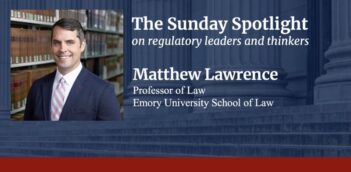Managing Regulatory Review in the Biden Administration
At the 2024 PPR Distinguished Lecture on Regulation, Administrator Revesz highlighted the Biden Administration’s regulatory reform efforts.
Weighing the Environmental Impacts of Deep-Sea Mining
Scholars evaluate the impact and efficacy of deep-sea mining regulations.
Week in Review
The U.S. District Court for the Eastern District of Texas vacates a Biden Administration rule expanding access to overtime pay, the CFPB issues a rule supervising digital wallet companies, and more…
Using Disability Justice to Reimagine Our Immigration System
Scholars propose a path forward to address ableism in the modern immigration system.
Balancing Conflicting Sustainable Development Goals
Scholars study the tradeoffs of sustainable wastewater management and avian biodiversity.
An Intersectional Approach to Regulating Women’s Health
Scholar calls for regulators to correct the dangers of inadequate cosmetics regulations for women of color.
The Virginia Model for Regulatory Modernization
Virginia can serve as a model for other states looking to reform and modernize their regulatory regimes.
The Regulation of Addiction
Matthew Lawrence describes how regulation can be used to respond to technology addiction.
Regulating Weight-Loss Drugs and Supplements
Scholars discuss the regulatory landscape surrounding GLP-1 drugs and dietary supplements.
Week in Review
The U.S. Court of Appeals for the D.C. Circuit overturns NEPA regulations, the National Labor Relations Board interprets federal union law as prohibiting captive-audience meetings, and more…
Congressional Constituent Service Inquiries
Scholar recommends improvements to agencies’ management of congressional requests on behalf of constituents.
Promoting Consistency and Transparency in Individualized Guidance
New research highlights the unique challenges agencies face when providing individual regulatory guidance.











